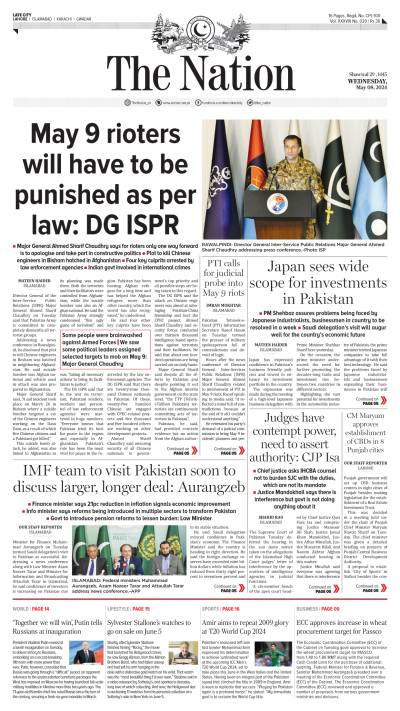KARACHI - State Bank of Pakistan Governor Syed Salim Raza has disclosed that the SBP is actively working with the industry and the Federal Government to develop Shariah compliant short-term securities, which will be issued on regular basis. Speaking on the occasion of a talk on 'Current Islamic Banking Paradigm and the Way Forward by Dr Umer Chapra, a renowned international scholar on Islamic Economics and Finance at SBP, premises here on Wednesday, Raza said that State Banks immediate objective is to improve and diversify avenues for short-term liquidity management for the Islamic banking industry. Islamic banks in Pakistan have to live with the big constraint of only being able to place their surplus funds with other Islamic banks, in the absence of suitable investment opportunity, he said and added that this market gap both limits earnings, and inhibits aggressive deposit mobilization drives. Raza said the Islamic banking in the country, from a modest start in 2002, has made a good progress and achieved 6% market share. The heightened global interest in the subject, particularly after the recent financial crisis, leads one to expect that Islamic banking will make more rapid strides globally and in Pakistan, he added. The SBP Governor stressed the need to improve understanding among investors more broadly about those principles in Islamic finance that provide investors assurance about risk evaluation and risk management frameworks and practices that improve upon most conventional counterparts. Referring to participatory financing modes, where risk is shared between the entrepreneur, the bank and the investor, he said that these structures can provide all the advantages that venture capital and private equity structures do in conventional finance without the risk often created by high leverage. The participatory modes also dont view the investment merely a financial exercise, but the one that seeks to achieve true economic value addition, he emphasized. He said that Islamic bankers could benefit from more training with respect to development to their capacity to apply Islamic banking tools and principles. He noted that while the State Bank has taken a number of initiatives in the past to train the Islamic bankers, the pace of growth of the industry is faster than the supply of trained and well qualified Islamic bankers. A strategy is, therefore, being developed to improve the skills of the Islamic banking industry professionals which include collaboration with reputed national and international institutions offering/sponsoring Islamic banking trainings, Raza added. Earlier, Dr. Umer Chapra, a renowned international scholar on Islamic economics and finance, said that there is a greater acceptability of Islamic finance in the world after the recent global financial crisis. Delivering a lecture, Dr Chapra said that Islamic Finance is now more respected all over the world because of several economic crises created by the global financial system in the last four decades. He said the recent financial turmoil was the most severe of all involving approximately $3 trillion to $4 trillion in bailout funds. He said that primary cause of the recent crisis was excessive and imprudent lending by the banks which happened because of inadequate market discipline and lack of regulation and supervision. He gave a complete run down on how the international financial crisis evolved and highlighted salient features of the Islamic financial system which can prevent occurrence of such a crisis in future. Dr. Chapra said that risk-sharing and equitable allocation of credit are the hallmark of Islamic financial system based on Islamic principle of justice. He said the Islamic financial system lays greater emphasis on equity and profit and loss sharing which make banks more cautious in lending and added that in Islamic system debt is not created through direct lending and borrowing but rather through the sale and purchase of real goods and services. He said the Islamic financial system puts several conditions on debt financing which, inter alia, include that the asset being sold or leased must be real and not notional or imaginary. Similarly, debt cannot be sold and the risk of default associated with it must be borne by the lender himself which will motivate creditor to be more careful in lending, he added. He said the market discipline that Islam imposes put a check on excessive expansion of debt. Dr. Chapra said that Islamic finance is still in its infancy stage but there is a lot potential of its growth.
Wednesday, May 08, 2024
SBP working to develop Shariah compliant short-term securities
WAPDA, SA Gardens secure spots in National Challenge Cup 2023 Semis
8:51 PM | May 08, 2024
Liaquat Baloch opposes Establishment's role in politics
7:55 PM | May 08, 2024
PTI founder says he wants to clear the air about 2014 sit-in
7:54 PM | May 08, 2024
Tahir Mahmood Ashrafi declares May 10 as stability day
7:52 PM | May 08, 2024
PM reiterates commitment to complete trade, connectivity projects with Uzbekistan
6:23 PM | May 08, 2024
FBR’s Flawed Policy
May 08, 2024
Rafah Invasion
May 08, 2024
Anticipating Turmoil
May 08, 2024
Northern Horizon
May 07, 2024
OIC’s Voice
May 07, 2024
Judicial equality
May 08, 2024
Urban accessibility
May 08, 2024
Unemployment crisis
May 08, 2024
Feast and famine
May 07, 2024
Streets of fear
May 07, 2024
ePaper - Nawaiwaqt
Advertisement
Nawaiwaqt Group | Copyright © 2024





